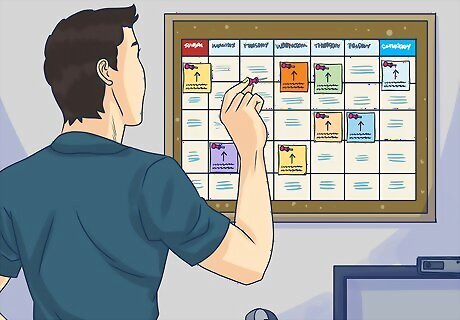
views
- Stay motivated by reminding yourself of your goals before and while you work on them. Check in on your progress regularly.
- Eliminate distractions: leave your phone in the next room, or install an extension on your browser to block social media sites while you work.
- Go easy on yourself and take regular breaks so you don't get burned out; everyone needs to recharge their batteries now and then.
Adopting a Motivated Mindset

Set specific, manageable goals with realistic deadlines. Before devoting time to any specific endeavor, make sure you know exactly what you're setting out to do—and when you hope to do it. Set specific and achievable short- and long-term goals, and develop a general timeline by which you intend to achieve your goals. Otherwise, it’s tempting to put off the work you need to do indefinitely. Before figuring out how and when you’ll achieve your goals, it’s important to understand the “why” behind those goals: why is this dream important to you? Journaling about your goals may help you define your goals and develop a clear vision. Reflect on your goals in a diary or on the notes app on your phone. Keep your goals realistic: that way, you won't be disheartened if you don't reach them. This doesn't mean you can't push and challenge yourself; if you don't challenge yourself, then it's not really a goal. Make your goals specific rather than vague. For instance, “Walk 10 thousand steps a day” is more specific—and therefore more achievable—than “Get more exercise.”

Develop a schedule of “checkpoint” goals, and check in regularly. You may know you want to have your dream job in 5 years, but you'll likely need to fulfill smaller goals on the way, like earning a specific degree or getting certain work experience. Establish regular checkpoints to track your progress, and check in often: if you see that you’re on track or even excelling when you check your progress, you’ll likely feel more motivated to continue. If you see that you are lagging on your goals, it may be the kick start you need to help get you back on track. Create a calendar or a to-do list of goals you hope to accomplish in the next week, month, or year, and check off each goal as you achieve it. Consider hanging up your calendar or list somewhere you'll see it regularly, like beside your bedroom mirror or above your desk. Or, keep a virtual calendar or to-do list on your phone.

Make sure to reward yourself every time you achieve your weekly goals. This could be as simple as a bowl of ice cream after a long, hard week of working out or as rewarding as a trip to the spa for all your hard work. Try to give yourself whatever rewards will keep you going. Be sure to assign rewards that don’t undermine the goal you’re working to accomplish. For example, a bowl of ice cream at the end of a week of exercise and dieting is a great way to treat yourself, whereas rewarding yourself for losing a pound by eating a whole pizza will likely undo the goal you just achieved.

Give yourself breaks. Sometimes, even the most determined people get overwhelmed. You may be burning yourself out, and a much-needed break might be just what you need to help you achieve your goal. If it's a fitness goal, for example, maybe take a three- or four-day rest instead of your normal one or two-day rest. If it's at school, don't try to do all your work in one sitting, but stretch it out over the course of the day or week, if possible.

Don't be too hard on yourself. Everyone falls short sometimes. If you fail to meet your goals for the week, take it as a lesson. Try to complete your next target before time, so that you can use the saved time to complete the pending work. This way, you'll stay right on schedule even if you have taken a hit. It's not always about how hard you hit, but how well you can take a hard hit and keep moving on. Don't dwell on failure; just accept it as a human occurrence, and continue working towards your goals. Practice positive self-talk to not only keep yourself motivated to achieve your goals but to keep you from being hard on yourself when you fall short. Implement a daily practice of reciting positive affirmations to yourself, like, “I am capable of achieving my goals” or, if you fall behind, “I’ll do better tomorrow.” If you’re struggling to regain your motivation after a few weeks, consider if there’s something deeper going on. Seeing a licensed therapist may help you understand why you’re having trouble staying motivated.

Watch and read motivational stories or speeches. Everyone deserves a great pep talk every once in a while. Stay elevated by watching YouTube videos of inspirational moments so you can suddenly feel a new sense of motivation to keep striving. Here are just a few examples of easily-found inspirational media: Mary Schmich's famous "Everybody's Free (To Wear Sunscreen)" speech. Almost any Hollywood sports movie. In lots of rap music, "rags to riches" is a common lyrical theme. Historical stories of bravery or courage (like those of Jack Churchill, Audie Murphy, and more).

Surround yourself with positive people. Developing a network of supportive and inspiring friends and mentors can make it a lot easier to stay motivated and achieve your goals. Reach out to classmates in your field or your favorite professors or bosses for advice and professional support—and make a point to stay in touch. They’ll be able to offer wisdom and encouragement, and perhaps even opportunities to help you achieve your goals. Your network doesn’t just have to be people with direct knowledge of or experience with the goal you’re hoping to achieve; it could also be people who offer you emotional support or whom you find inspiring, like friends or family.
Beating Procrastination

Eliminate your distractions. Identify anything that's causing you to procrastinate, then get rid of it—at least while you’re working toward your goal. You can't become motivated if you're squandering all of your time, so it's imperative to get rid of all distractions. If you're spending too much time aimlessly browsing social media, delete your social media apps from your phone and install a "productivity" extension in your browser. These free extensions allow you to block certain sites and/or set time limits for recreational browsing. If you’re too tempted to text or call your friends when you’re supposed to be working, leave your phone in the next room. Keep your workspace as tidy as you can. A clutter-free desk will make it easier to focus on your work. Avoid multitasking: it might sound efficient, but it’s easier to lose your focus and make mistakes when your brain is forced to switch from one task to another. Just do one thing at a time.

Raise the stakes for yourself. Hold yourself accountable in your own eyes and the eyes of others. Set personal penalties for yourself if you don't throw out some delicious cookies you've been saving or make a donation to charity. Tell your friends and family about things you plan on doing. If you don't do these things, they'll know, and you'll be embarrassed—now you have a great reason to get started! Write yourself little notes to keep you motivated or set a reminder on your phone that reminds you every 20 minutes of a task you need to accomplish. This might get annoying enough to make you actually do it.

Have a cup of coffee or tea for some extra energy. The caffeine found in coffee and tea can give you a helpful boost and keep you motivated longer. Even just the smell of coffee has been shown to make people more alert and focused! Not only can caffeine boost your energy, but the simple act of taking a coffee or tea break can help restart your engine if you’re feeling low on motivation. Stay away from more powerful stimulants unless a doctor has prescribed them for a specific condition. They can be extremely habit-forming if used carelessly.

Get some exercise. Go for a short run, do some jumping jacks, or shadowbox. Even light physical exercise can affect our moods, making us feel more active and dynamic. Exercise has even been shown to thwart depression and low self-image—both hurdles to personal motivation efforts.

Break your task into manageable pieces. If you're having serious motivation problems, breaking one large task into many small tasks can make it much easier to approach psychologically. Because we get a feeling of accomplishment from completing each step of the task, this trick can increase motivation substantially. Sometimes, all that's needed to gain the momentum to tackle the whole project is to complete the first simple step.

Change up your routine once in a while. Even tremendously motivated people can be driven to lethargy and inaction if they have to perform tedious, repetitive tasks for weeks or months on end. Break up the monotony with spontaneous and out-of-the-ordinary activities. Try to create an internal sense of unpredictability—even if you don't know exactly what you'll do tomorrow. This can ease the psychological tedium of work that is the same day after day. Here are just a few ideas you might want to experiment with: Spend a lunch break at a scenic place outdoors. Have an impromptu soccer game with friends or coworkers. Surprise your workplace with some home cooking. Take a friend or significant other out for a night on the town, even if there's no special occasion. Change your personal style. Cultivate a drastically different look, then wait for reactions from your friends and coworkers.



















Comments
0 comment